Our recycling crisis reveals a huge opportunity for South Australian businesses
Your trash is the treasure for many SA businesses — as the China Sword recycling crisis takes hold and the state prepares for new plastic bans, we look at local initiatives to stay ahead of the curve.
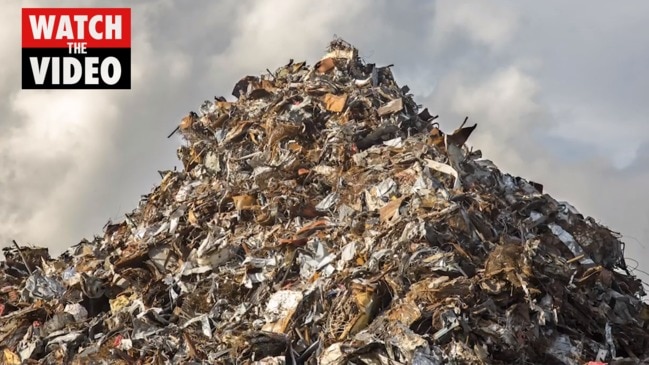
Disposable coffee cups, plastic straws, foam food containers and plastic bags are becoming the new enemies as we wage a war on waste.
It wasn’t too long ago we were told being responsible with your rubbish meant not being a “litterbug” and leaving food wrappers, drink containers or cigarette butts on the street or at your local picnic spot.
But in 2019, the idea of addressing our growing trash problem is a much more complicated affair.
The Pacific Trash Vortex is getting bigger, council dumping fees are skyrocketing in a bid to divert waste from landfill and televisions are broadcasting vision of plastic and glass piling up in interstate warehouses.
Amid all of the confusion about how we deal with our rubbish, South Australian businesses are realising the opportunity in what might otherwise seem a very bleak affair.
This month, the State Government announced a plan to ban plastic straws, drink stirrers and cutlery as part of a push to lead the nation on curbing single-use plastic use.
Foam cups and takeaway containers will be next in the firing line, and Environment Minister David Speirs says “further consideration” is needed before taking action on plastic bags, coffee cups and takeaway containers.
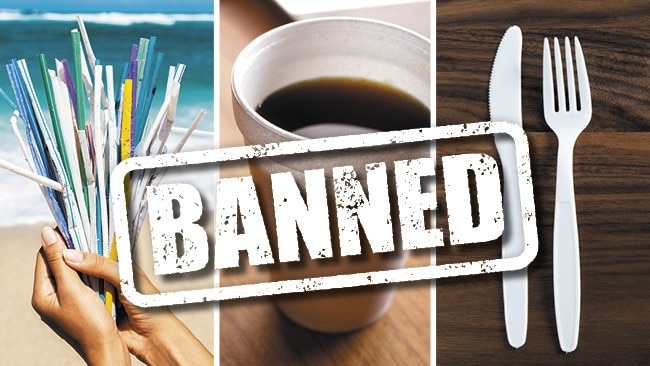
Brompton-based packaging business Detpak is in the box seat to benefit from the changes in South Australia, although marketing and innovation manager Tom Lunn says the real windfalls will arrive if other states follow suit.
“SA makes up about 8 or 9 per cent of the national packaging market,” Mr Lunn says.
“But it’s an important lead market because most of the big users of packaging are national and global brands and so they need to comply in South Australia.”
Companies will be watching closely as they expect plastic and packaging reforms implemented here to eventually roll out across the country, Mr Lunn says.
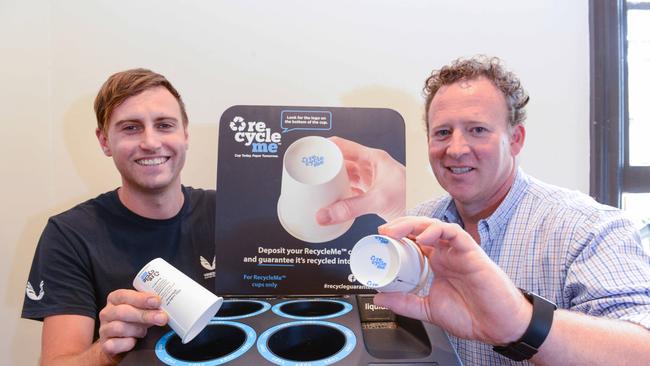
Detpak produces paper carrybags and packaging here, and also makes reusable coffee cups, paper straws and other products in Asia.
It has some big clients, from fast-food giants to clothing chains, such as Cotton On, Country Road and Mimco.
Mr Lunn says over the past five years, he’s seen a definite drive towards customers demanding more sustainable packaging.
“It’s good for us and anyone who’s prepared to do things differently,” he says.
“There's a steady increase in conversations with people wanting to make changes. And there’s a huge confusion in the market out there — ‘Should we go compostable or recyclable and what is the difference?’.”
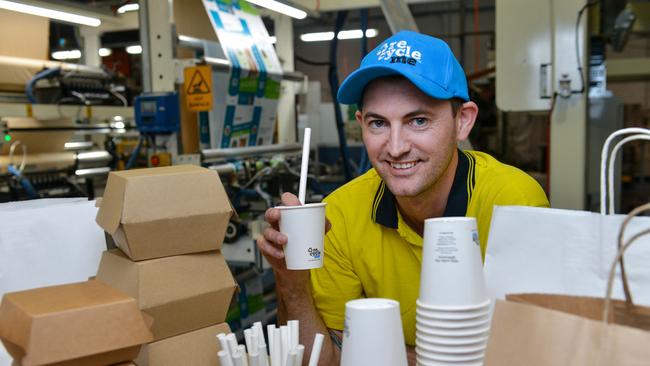
Under potential single-use plastic bans, Detpak forecasts it could hire 36 extra people to help make and import extra cups, plates, straws and produce and carrybags.
In a recent submission to the State Government during consultation on plastic use, the business said about 25 new jobs might also be created at its partner Shred-X, which recycles reusable coffee cups.
In response to demand, over the past three years, Detpak had opened a manufacturing plant in India and expanded other centres in Australia, Vietnam, the Philippines and China.
Green Industries SA, the Government department responsible for developing our “green economy”, says data shows plastic production increased from 15 million tonnes in 1964, to 311 million tonnes in 2014 across the globe. It is expected to double again over the next two decades.
Packaging made up 26 per cent of the total amount of plastics used globally.
After China banned imports of cardboard, paper, glass and plastic a year ago, governments and businesses have been left with the task of finding new markets for our waste.
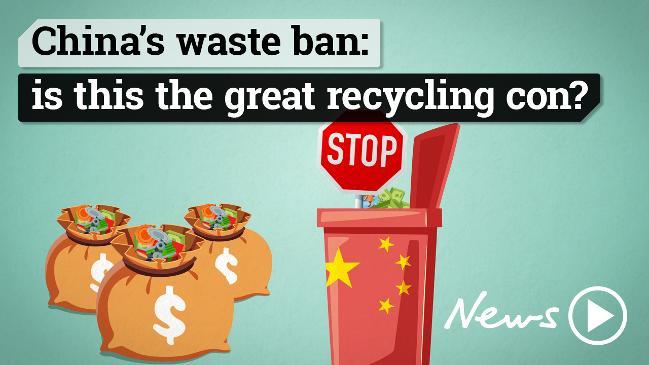
In Kilburn, Advanced Plastics Recycling coverts about 1500 tonnes of waste from kerbside recycling into products such as decking, bollards, bridges, fencing and furniture.
Chief executive Ryan Lokan says new plastic bans in SA are likely to benefit his company as they increase awareness about more sustainable product alternatives.
He says sales have already increased 150 per cent each year over the last two years.
In that time, the business has hired an extra five staff, and another five are likely to be needed to meet demand over the coming 18 months — even more if the Government’s plastic bans take off.
KESAB’s executive director John Phillips says South Australia has already picked the “low-hanging fruit” in its bid to curb excessive landfill, through measures such as the container deposit scheme and advances in kerbside recycling.
He says the harder part will be reducing other plastics such as cling wrap, straws, bread bags and disposable cutlery.
If current trends continue, by 2050, there will be more plastic in the world’s oceans by weight, than fish.
“There’s also evidence we’re starting to consume microplastic through the food chain, so it’s not just pollution — there’s other impacts,” Mr Phillips says.
“The number of responses to the single use plastic (consultation) was over 3000, which is unheralded so that’s how people are thinking — but their thinking has to convert to action.”
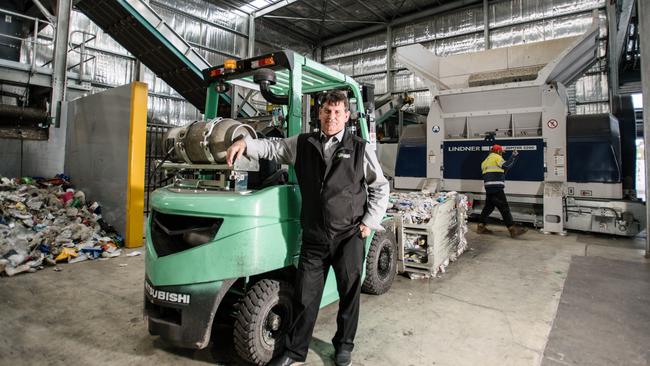
Among the solutions needed, Mr Phillips says, is the State Government returning more of the solid waste levy to the sector to spend on educating the public and technology upgrades, to boost the industry.
The levy, paid by councils, increased to $110 per tonne this month and from next year it will reach $140.
At Kilburn-based Recycling Plastics Australia, managing Stephen Scherer says the company expects to be turning over an annual 40,000 tonnes of recycled material by next June.
Mr Scherer said legislation to mandate percentages of recyclable material in packaging would help address the country’s plastic problem.
“If we have a resource and we refuse to reuse it again, it makes us pretty dopey as people,” he said.
“There’s no difference between recycled material and new material if it’s recycled well enough.”
Environment Minister David Speirs plans to introduce new laws into State Parliament next year to make way for the single-used plastic bans.
Mr Speirs said the State Budget included a $12 million waste management package to boost resource recovery through investment, infrastructure, education and modernisation of council and industry collection services.
“This funding is on top of the $12.4 million support package announced in 2018 to help the recycling industry and local government in response to China’s National Sword Policy,” Mr Speirs said.
“These announcements will lead to less waste sent to landfill, a reduction in emissions, and will also provide vital stimulus to our world-leading waste management and resource recovery sector, leading to potentially more than 200 additional jobs here in South Australia.”
The Government recently launched its “Which Bin” campaign, which aims to help answer questions about what can be recycled, and how. For details, visit whichbin.com.au/tips.
